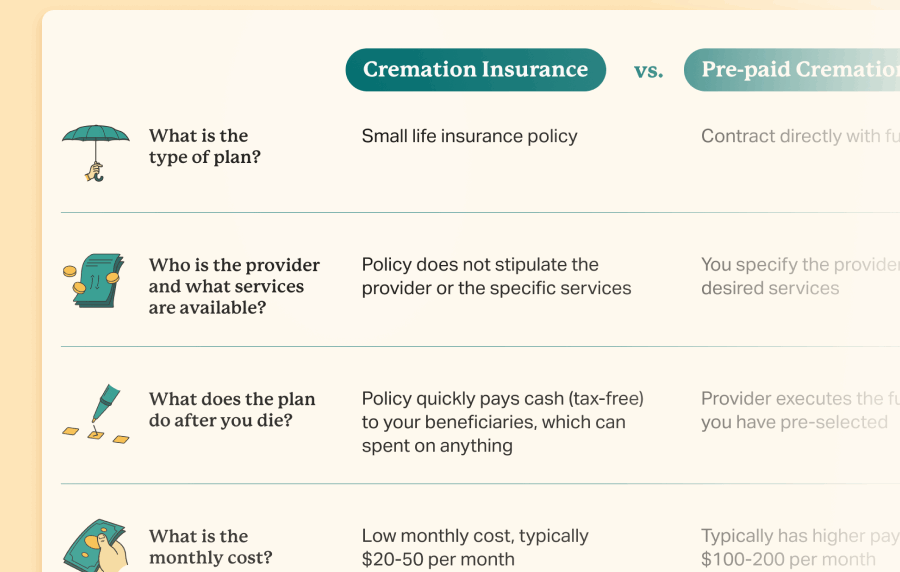Requirements When Buying Life Insurance For A Grandparent
The only requirement for a grandchild to take out life insurance for a grandparent is that they (the grandparent) are willing to answer the health questions (if any) and sign the application. If your grandparents are unwilling to partake in the process, there is no way to insure them.
If they refuse to participate, your best end-of-life planning option would be a pre-paid burial plan or putting money into a savings account.
Life insurance companies require beneficiaries to have an insurable interest when buying coverage for a family member. Insurable interest is whether or not the beneficiary would suffer a financial loss due to the insured’s death.
A grandchild’s most common insurable interest is to cover their grandparent’s funeral costs, medical bills, and other end-of-life expenses.
That said, burial insurance coverage up to $100,000 requires no explanation regarding why you want the insurance. However, if you want more than $100,000, you must demonstrate how their death would cause a financial burden.
What Type Of Life Insurance Is Best For A Grandparent?
Final expense insurance is likely the best life insurance for your grandmother or grandfather since covering funeral expenses is why most grandkids want to insure their grandparents.
That said, which type of policy and company is best depends on their health, age, and why you need coverage.
| Policy Type | Age Range For New Applicants & Typical Coverage Options | Best Reasons To Buy | Medical Exam Required? |
|---|---|---|---|
| Final Expense Whole Life | 0-90 $1,000-$100,000 | End of life expenses, final medical bills, or other last debts | No |
| Guaranteed Acceptance Whole Life | 45-85 $2,000-$25,000 | Very dire health issues that renders you uninsurable for products with underwriting | No |
| Traditional Whole Life | 0-85 ≥ $50,000 | Estate planning, debt payoff, spousal income protection, very high funeral costs, or leave a legacy for your heirs. | 0-80: No 81-85: Yes |
| Universal Life | 0-85 ≥ $50,000 | You want permanent coverage with flexible payment options, estate planning, debt pay payoff, spousal income protection, retirement supplementation, final expenses, a legacy for heirs | 0-80: No 81-85: Yes |
| Term Life | 18-80 ≥ $50,000 | Financial debts or income replacement | 0-79: No 80: Usually |
Final expense insurance
Final expense insurance is a small whole life insurance policy that provides peace of mind knowing you can pay for your grandparent’s burial or cremation costs when they die.
They don’t need to be in good health to qualify because the underwriting is very lenient, and there is no medical exam.
The policy will pay out a lump sum cash benefit to the beneficiary, and there are no restrictions on how the money is spent. Because the policy is whole life, the premiums will not change, and the coverage lasts forever.
Guaranteed acceptance
Guaranteed life insurance is a type of whole life insurance policy with no health questions or underwriting. Because acceptance is guaranteed, there is a two-year waiting period.
If they die during the waiting period, the insurance company will only refund your premiums plus a small amount of interest. This type of policy is only advisable if they have dire health conditions such as heart failure, renal failure, or Dementia.
Traditional whole life
Whole life insurance is a type of permanent life insurance that builds cash value. Whole life insurance rates never change, and the coverage doesn’t expire or decrease in value.
Traditional whole life plans typically require you to buy $100,000 or more in coverage, and you’ll need to be in good health to qualify.
Term life insurance
A term policy is a life insurance plan that will expire after a predefined period of time. It might last a certain number of years (such as 5, 10, or 15) or until a certain age (such as 70, 75, or 80). After the policy expires, you no longer have insurance.
Some term life insurance plans have a fixed cost. However, some companies (such as >AARP life insurance or Globe Life insurance) have monthly premiums that increase every five years.
Generally speaking, nearly all term life coverage will expire at or around age 80.
Universal life insurance
A universal life policy is technically considered permanent insurance (although it rarely lasts forever).
They’re often sold to supplement retirement or diversify your investment portfolio. The main thing to understand is that these plans rarely last forever.
They’re usually marketed as permanent coverage that is less expensive than whole life.
While they are less costly than whole life (for the same amount of coverage), it’s generally an illusion.
We say that because universal life policies often crash shortly after age 75 or 80, leaving the policy owner without coverage.
Grandparent Life Insurance Quotes
The rate chart below shows what burial insurance may cost for your grandparents.
Remember that all life insurance prices are based on the insured’s resident state, gender, tobacco usage, coverage amount, and health.
5 Tips When Buying Life Insurance For Grandparents
Buying life insurance for a senior grandparent can be tricky, given their age and potential health complications.
Consider these tips to ensure you find the right policy at the best price to meet your needs.
- The type of policy matters greatly: There are many types of life insurance plans (whole, term & universal). Furthermore, they all function differently. Be sure to choose the correct type to accomplish your goal rather than deciding solely on price.
- Obtain their consent first: It’s best to have a quick conversation with your grandparents so they know you want to buy life insurance coverage for them. Just make sure they are on board with participating in the process. If they aren’t, there is no way to insure them.
- Learn about their health: If you know about their past and current health issues, an insurance agent can give you detailed product information. That includes accurate life insurance quotes, policy options, and waiting period provisions (if any), to name a few. Without their health information, you’ll only get very general information not specific to your grandparents.
- Utilize an independent insurance agent: Independent agents represent multiple insurance providers for your benefit. They will compare offers from various providers to find you the best deal possible. Also, their services are free. Captive insurance agents (State Farm is one example of a captive company) can only represent one single company. That means they cannot check if another provider would offer you a better policy.
- Be open-minded about insurance companies that aren’t household names: There are hundreds of life insurance companies in the USA. Conservatively, less than 1% advertise in mass media to become a household name like Aflac or State Farm. When buying life insurance for your grandmother or grandfather, it would be best not to exclude 99% of the companies available.
How To Get No Waiting Period Final Expense Life Insurance For Your Grandparents
With funeral life insurance, there are three different types of plans. Which one your grandparents are eligible for depends on their health.
- No waiting period: An immediate coverage plan will pay out 100% of the death benefit starting on day 1 of the policy. The only exception is suicide or if you lie about your health when you complete the application.
- Partial waiting period: The insurance provider will pay a portion of the death benefit. It’s usually 30-40% during months 1-12 and 70-80% during months 13-24. After two years, the total coverage amount is payable.
- Two-year waiting period: The insurance company will only refund all premiums paid plus interest. They will not pay out for natural causes during the waiting period.
You must apply for a plan with health questions to get partial or immediate coverage. Your grandparents won’t have to take an exam but must complete a health questionnaire.
Truthfully, most seniors can qualify for immediate or partial coverage.
Remember, final expense policies for seniors are designed to accept many health risks. It’s not like life insurance for a grandchild, who needs to be in near-perfect health to qualify.
At the end of the day, you’ll need to speak with an agent if you want immediate coverage life insurance for your grandparents.
Only a licensed insurance agent can determine which life insurance companies will approve your grandparent for no waiting period life insurance coverage.
If you have a grandparent with pre-existing conditions and want to get them no waiting period coverage, call us at 1-800-644-2926. At Choice Mutual, we have over 15 different insurance companies. We’ll do our best to find them a policy with full day-one coverage.
Best Life Insurance Companies For Grandparents Over 80
Getting life insurance for a senior over 80 is still possible with many companies. If your grandparents are above 80 or even 85, your best option will likely be with one of these final expense companies.
Use our quoting tool to get quotes for any of these companies.
| Insurance Company | Coverage Options Above 80 | Max Age For New Applicants | Policy Type | When Policy Can Pay Out |
|---|---|---|---|---|
| $2,000-$50,000 | 85 | Final Expense Whole Life | No waiting period | |
| $1,000-$25,000 | 85 | Final Expense Whole Life | No waiting period | |
| $2,000-$25,000 | 89 | Final Expense Whole Life | No waiting period | |
 | $2,500-$10,000 | 90 | Final Expense Whole Life | No waiting period |
| $2,000-$10,000 | 90 | Final Expense Whole Life | Refund of premiums in first 12 months, 50% payout in 2nd year, then full benefits after 2 years |
Frequently Asked Questions
You cannot legally buy life insurance coverage for a grandparent without their knowledge. Even if you have power of attorney over them, your grandparent(s) will still need to sign the application. If they won’t partake in the process, there is no way to insure them.
On average, buying a final expense insurance policy for a grandparent will cost $75-$200 monthly. The exact price depends on their age, gender, health, and how much coverage you select.
No medical exam is required if you’re buying burial insurance for a grandparent. However, other types of coverage, such as term or universal life, might require an exam. Medical exam requirements vary based on their age, health, death benefit amount, and which type of policy you’re interested in.
- Nationally licensed life insurance agent with over 16 years of experience
- Personal annual production that puts him in the top .001% out of all life insurance agents in the nation.
Anthony Martin is a nationally licensed insurance expert with over 16 years of experience and has personally served over 10,000 clients with their life insurance needs. He frequently authors entrepreneurial and life insurance content for Forbes, Inc.com, Newsweek, Kiplinger, and Entreprenuer.com. Anthony has been consulted as an expert life insurance source for dozens of high-profile websites such as Forbes, Bankrate, Reuters, Fox Business, CNBC, Investopedia, Insurance.com, Yahoo Finance, and many more.
- Nationally licensed life insurance agent with over 20 years of experience
- Best selling Amazon author.
Jeff Root is a nationally licensed life insurance expert with over 20 years of experience. He has personally helped over 3000 clients with their life insurance needs. Jeff is a best-selling Amazon author and the managing partner of a highly successful insurance brokerage that manages over 2,500 licensed insurance agents across the USA. He has been a featured life insurance source for prestigious websites such as Forbes, Bloomberg, MarketWatch, Nerdwallet, and many more.
- Nationally licensed life insurance agent with over 15 years of experience
- Best selling Amazon author of five insurance sales books.
David Duford is a nationally licensed insurance expert with over 15 years of experience. He has personally helped more than 15,000 clients buy life insurance. David has been featured as an expert source for highly authoritative publications such as A.M. Best and Insurancenewsnet. He also runs one of the largest Youtube channels to help aspiring insurance agents serve their clients better.
- Nationally licensed life insurance agent with over 20 years of experience
- Best selling Amazon author.
Jeff Root is a nationally licensed life insurance expert with over 20 years of experience. He has personally helped over 3000 clients with their life insurance needs. Jeff is a best-selling Amazon author and the managing partner of a highly successful insurance brokerage that manages over 2,500 licensed insurance agents across the USA. He has been a featured life insurance source for prestigious websites such as Forbes, Bloomberg, MarketWatch, Nerdwallet, and many more.
- Nationally licensed life insurance agent with over 15 years of experience
- Best selling Amazon author of five insurance sales books.
David Duford is a nationally licensed insurance expert with over 15 years of experience. He has personally helped more than 15,000 clients buy life insurance. David has been featured as an expert source for highly authoritative publications such as A.M. Best and Insurancenewsnet. He also runs one of the largest Youtube channels to help aspiring insurance agents serve their clients better.
Choice Mutual often cites third-party websites to provide context and verification for specific claims made in our work. We only link to authoritative websites that provide accurate information. You can learn more about our editorial standards, which guide our mission of delivering factual and impartial content.
-
insurable interest. https://www.investopedia.com/terms/i/insurable-interest.asp
-
A term policy. https://www.guardianlife.com/life-insurance/how-term-life-works








